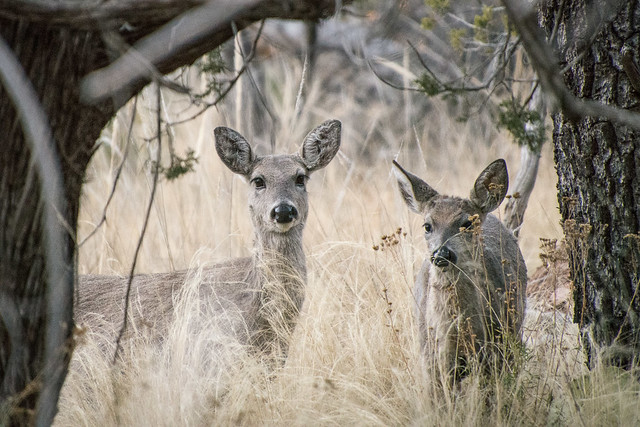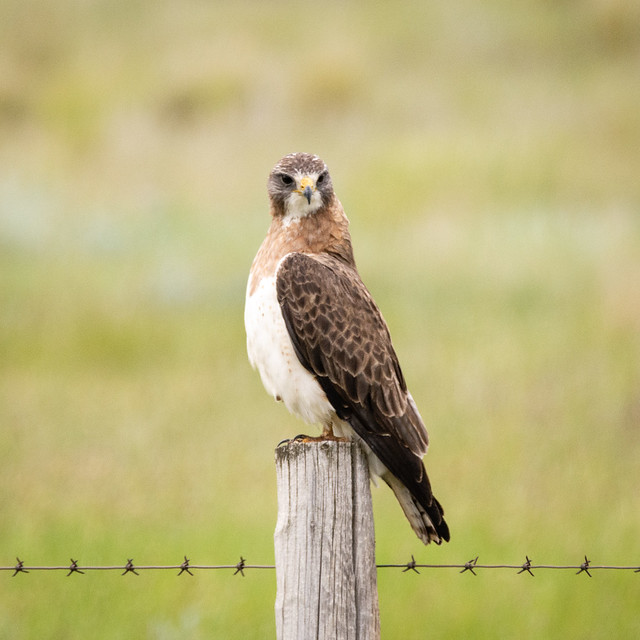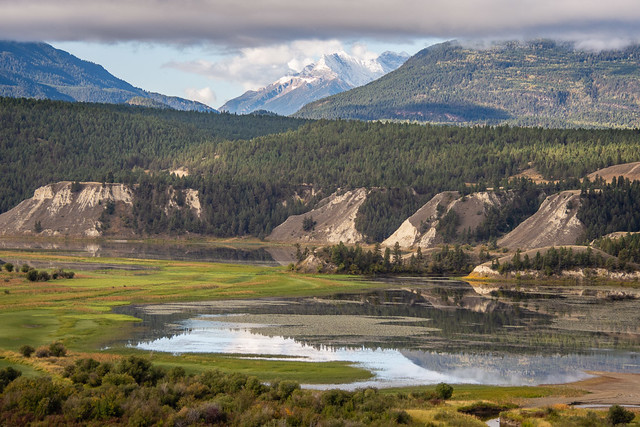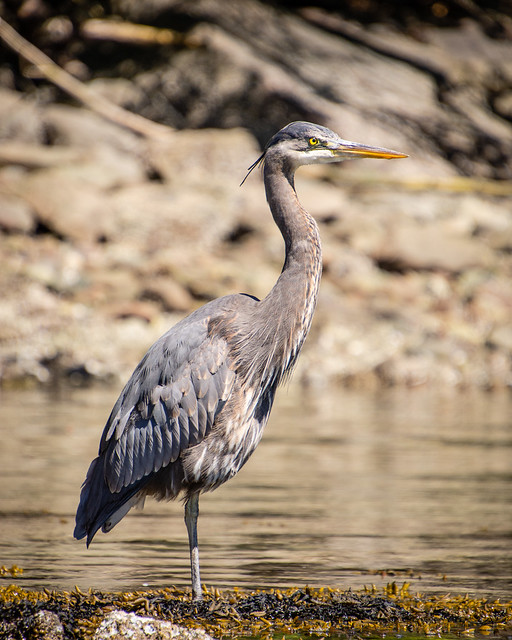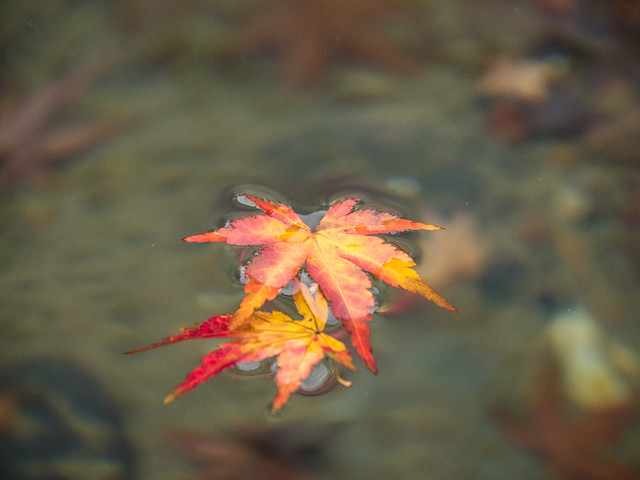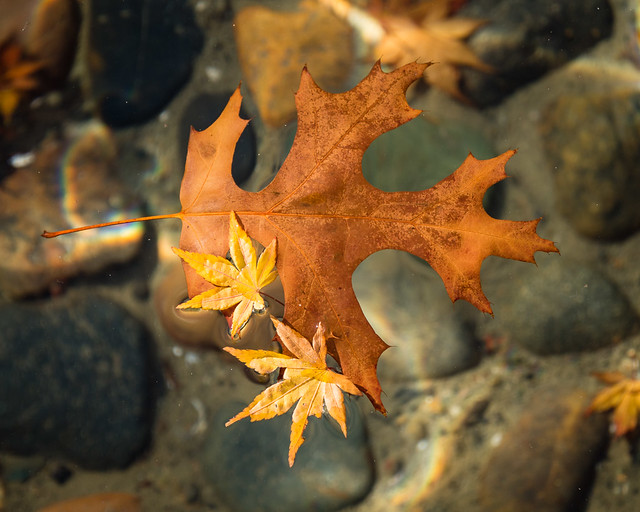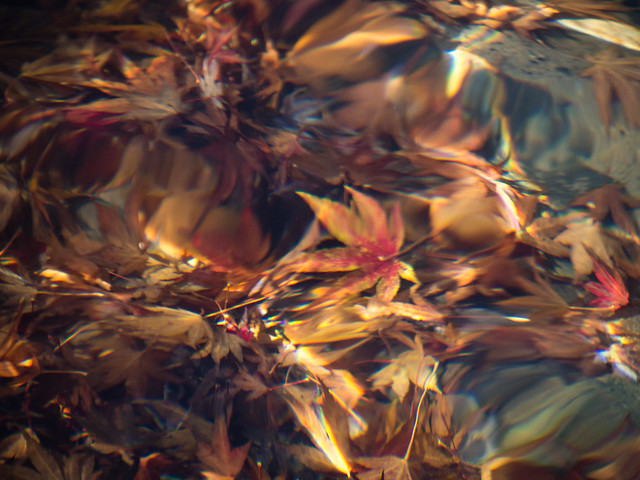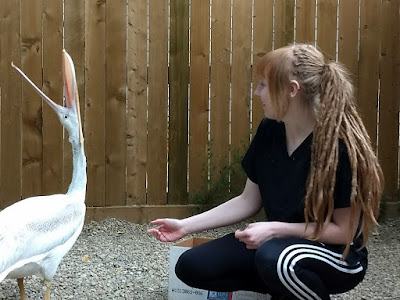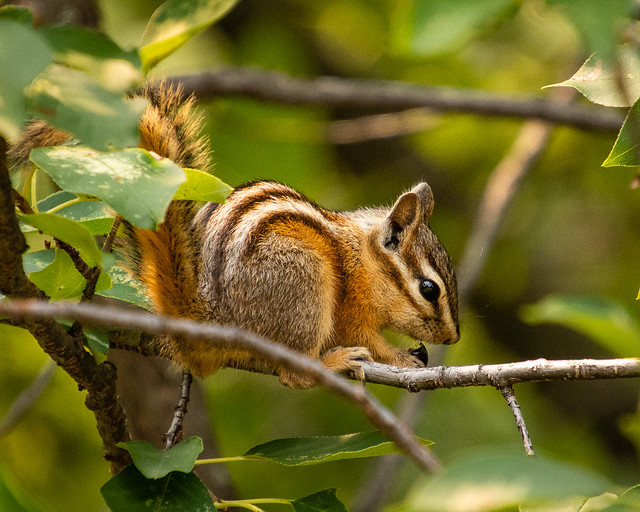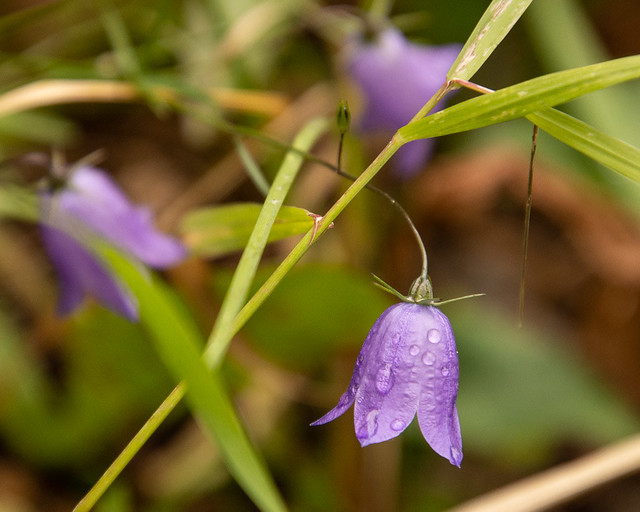Thursday, 27 September 2018
Using the Law to Protect the Environment
Environmental groups are increasingly turning to the law to protect nature and wildlife. Their initiatives range from sharing information to setting standards, taking issues to court, and granting nature legal rights.
Sharing Information
The Environmental Law Centre in Edmonton provides advice and education on environmental issues. They help community groups understand and use legal tools and work with government policy-makers to create better decision-making processes. In 2017, they published A Road Map for Environmental Rights in Alberta: Rights for a Sustainable Future. The publication recommends an environmental bill of rights that will legally strengthen environmental accountability by promoting meaningful participation in environmental decision-making, providing citizens with enforcement tools, and ensuring oversight of reviews, laws, and administration.
A group of Saskatchewan lawyers, students, and members of the public have recently established SKAEL – the Saskatchewan Association for Environmental Law. Their goal is to raise awareness about environmental issues and laws, build legal and advocacy skills, and push for strong and effective environmental laws in Saskatchewan. The group invites people to get involved, collaborate with them on projects, forward legal inquiries, and spread the word. SKAEL has a website and is also on Facebook and Twitter.
Setting Standards
The law can be used to establish administrative policies, standards, and regulations. These vary considerably in both breadth and impact. The Environmental Law Centre at the University of Victoria, on behalf of Bulkley Valley Naturalists, is asking the provincial government to change its road maintenance policy. “While the existing policy recommends contractors schedule maintenance outside of nesting seasons or take measures to ensure birds are not present and nesting before brushing, it does not go far enough. According to the ELC report, the policy must prohibit roadside brushing during nesting season to remain onside the federal Migratory Birds Convention Act. If that is unavoidable, contractors should have to seek expert advice and action to ensure birds are not present.”
On a far broader scale, the State of Massachusetts has adopted a Clean Energy Bill. It sets a goal of 35% renewables by 2030 and a storage target goal of 1,000 MWh. In addition, it establishes a Clean Peak Standard, requiring every retail electric supplier to provide a “minimum percentage of kilowatt-hours sales to end use customers from clean peak resources.”
Court Cases
A number of Canadian non-profits – Ecojustice, West Coast Environmental Law, Canadian Environmental Law Association, East Coast Environmental Law – undertake court cases to protect the environment. Ecojustice “goes to court and uses the power of the law to defend nature, combat climate change, and fight for a healthy environment for all.” West Coast Environmental Law believes “By putting the law in the hands of communities and creating legal risk for those who would harm our land, air and water, we are building the collective power to achieve a more just and sustainable future for all.”
An Ecojustice case in Ontario established that “It is now illegal to kill or injure birds with light reflected from building windows under provincial and federal laws. According to section nine of the Environmental Protection Act, Ontario’s Ministry of the Environment must regulate any building discharging a contaminant that is killing birds. Under SARA, building owners or managers can be convicted under section 32 for the conduct of killing or injuring birds in window strikes.”
A logging project along Yellowstone National Park’s border was halted when the environmental groups “successfully argued that the forest failed to consider the project’s impacts on Canada lynx, which has been listed as a threatened species in the United States since 2000.”
Granting Nature Legal Rights
Western legal systems and government have traditionally viewed land and water as property. The Chilean Free-Flowing Rivers Network says “the time has come to look at granting legal rights — a form of legal personhood — to the nation’s rivers. . . . corporations are granted the same rights as people while the living ecosystems upon which we depend for survival are not.” In 2017, the government of New Zealand granted the status of legal personhood to the Whanganui River. A committee, including community representatives, will act as legal administrator and the river can now be represented in court proceedings.
A 2018 article in Yale Environment 360 says, “Despite the promise held by establishing legal rights for rivers, difficult questions remain. What does it mean for a river to have the rights of a person? Does a river have the right to flow freely, and does this mean its waters can’t be dammed or diverted? Is compensation to affected communities permissible in lieu of court orders requiring removal of large obstructions like dams? What can we do to move beyond merely acknowledging humanity’s connection to rivers to actually saving them? And, finally, and perhaps most important, how should a legal regime determine who will advocate on behalf of a river, which lacks a voice of its own?”
The Earth Law Centre believes “nature should be able to defend its rights in court, just like people can.” Earth Law views humans as co-equal partners with other Earth members. All members should have “the right to be, the right to habitat and the right to fulfill its role in the ever-renewing processes of the Earth community. As co-equal members, humans ‘have no right to prevent other components of the Earth community from fulfilling their evolutionary role’.”
A lawyer in the United Kingdom launched Mission Lifeforce in 2017. The Mission wants to add ecocide to the list of international crimes. They define ecocide as “serious loss, damage or destruction of ecosystems, and includes climate or cultural damage as well as direct ecological damage.” If they were successful, CEOs and government ministers could be held criminally responsible for serious damage to the environment.
Tuesday, 25 September 2018
EcoSask News, September 25, 2018
Upcoming Events
Climate Change, Sept. 27 (Prince Albert)
Dave Stevenson will give a presentation on climate change at 7 pm, Sept. 27, as part of National Forest Week activities in Prince Albert.
Wild Ecol Seminar Series, Sept. 28 (Saskatoon)
The WildEcol seminar series is held at 3:30 pm, every other Friday, on the U of S campus:
Sept. 28 – Large mammal distribution and conservation in Brazil
Epic, Sept. 29 (Prince Albert)
Enjoy the film Epic at 2:30 pm, Sept. 29, as part of National Forest Week activities in Prince Albert.
Household Hazardous Waste Day, Sept. 29 (Regina)
City of Regina is holding a Household Hazardous Waste Day from 9 am-3:45 pm, Sept. 29.
Regina Beach/Last Mountain Lake Migration, Sept. 29 (Regina)
Join Nature Regina for a field trip to Regina Beach and Last Mountain Lake from 9 am-1:30 pm, Sept. 29.
Waste & Recycling Town Hall, Oct. 2 (Regina)
Councillor Andrew Stevens will be holding a town hall to discuss waste and recycling programs at 7 pm, Oct. 2 in the Cathedral Community Centre.
Nature Play Workshop, Oct. 2 (Saskatoon)
SaskOutdoors is offering a nature play workshop for early years educators in Saskatoon from 1-3 pm, Oct. 2.
Pathway to PACE in Alberta, Oct. 3 (Saskatoon)
Brian Scott will discuss PACE Alberta at the Oct. 3 breakfast meeting of SK Energy Management Task Force.
NatureCity Festival Celebration & Planning Kick-off, Oct. 4 (Saskatoon)
Join Wild About Saskatoon from 7-9 pm, Oct. 4, as they begin planning the 2019 NatureCity Festival.
Saskatoon Nature Society Field Trips
Golden Eagles
Oct. 4, 9 am – Whooping Cranes
Oct. 11, 9 am – Fall Migration
Retirees and partners who are interested in birds and the natural world are invited to participate.
Other Saskatoon Nature Society Field Trips
Oct. 6, 8 am-5 pm – Whooping Crane Field Trip
Oct. 8, 9:30-11:30 am – Woodlawn Cemetery Bird Walk
Oct. 13, 1:30-3:30 pm – Invasive Shrub Removal from Saskatoon Natural Grasslands
Everyone is welcome. Check the Saskatoon Nature Society’s website for full details and updated information.
A full list of upcoming events can be found on the EcoFriendly Sask Calendar
In the News
The Waste Reduction Council of Saskatchewan is holding a pilot car seat recycling project in Regina and Saskatoon from mid-October to mid-November. Sign up to participate.
Congratulations, Wild About Saskatoon, on receiving a Tourism Saskatoon leadership award for your ongoing success with the NatureCity Festival. 3,000 people participated in events hosted by 50 organizations during the 2018 Festival.
The Insurance Bureau of Canada is calling on municipalities to reduce flood risk through conservation and restoration of natural infrastructure (ponds, wetlands).
Audio tours invite New Yorkers to explore the nighttime lives of the animals whose habitat they share.
A great city needs great facilities for pedestrians. What would a truly walkable city look like?
EcoSask News is a weekly round-up of local news and events. Email us if you have items you would like us to include.
You can follow EcoFriendly Sask by liking us on Facebook, following us on Twitter, or by email (top right corner).
Labels:
Birds,
Climate Change,
Energy,
Movies,
Pedestrians,
Prince Albert,
Recycling,
Regina,
Saskatoon,
Waste,
Water,
Wild about Saskatoon,
Wildlife
Tuesday, 18 September 2018
EcoSask News, September 18, 2018
Upcoming Events
Renewable Power, the Intelligent Choice AGM, Sept. 18 (Prince Albert)
There will be a presentation about the upcoming Smarter Science, Better Buildings exhibit at the Sept. 18 annual general meeting of Renewable Power, the Intelligent Choice.
Sustainability on Campus, Sept. 21 (Saskatoon)
Join the U of S Office of Sustainability from 12-1 pm or over a pint at 5 pm, every third Friday of the month.
Fall Hike, Sept. 22 (Moose Jaw)
Join the Moose Jaw Nature Society on a fall hike starting at 10 am, Sept. 22.
Science Experiments for Kids, Sept. 22 (Regina)
Kids ages 7-12 can participate in some fun science experiments from 1-2 pm, Sept. 22, at the Albert Branch, Regina Public Library.
Carbonless Concert, Sept. 22 (Saskatoon)
Enjoy solar-powered live music from 6:30-9 pm at the Sept. 22 Carbonless Concert.
Fall Composting for Beginners, Sept. 23 (Regina)
Learn about composting in winter from 2-3 pm, Sept. 23, at the Sunrise Branch, Regina Public Library.
Autumn Plant Walk, Sept. 23 (Regina)
Join Edible Landscapes Permaculture Design on Sept. 23 to learn about edible and medicinal plants in the Regina area.
World Rivers Day, Sept. 23 (Saskatoon)
Celebrate World Rivers Day from 12-5 pm, Sept. 23, at Beaver Creek Conservation Area - from tiger salamanders to oceans.
Beaver Creek Riparian Tour, Sept. 23 (Saskatoon)
Find out how to protect streams and creeks from 3:30-4:30 pm, Sept. 23.
Man of the Trees, Sept. 25 (North Battleford)
Paul Hanley will read from Man of the Trees: Richard St. Barbe Baker, the First Global Environmentalist from 7-8 pm, Sept. 25, in North Battleford.
Is NAFTA Locking in a High-Carbon Future? Sept. 25 (Prince Albert)
Find out how the North American Free Trade Agreement regulates oil and gas exports and how it could impact transitioning to a low-carbon future at 7 pm, Sept. 25.
Grassland Songbirds in Qu’Appelle Valley, Sept. 25 (webinar)
A noon-hour webinar on Sept. 25 will discuss songbird conservation efforts and the Qu’Appelle Valley as a focal area for conservation.
Discover the “Sci” in “Sci-Fi”, Sept. 25 (Saskatoon)
Learn the factual basis for fictional aliens and predatory horrors of the insect world at Café Scientifique Saskatoon, 7:30 pm, Sept. 25.
To the Ends of the Earth, Sept. 26 (Regina)
Cinema Politica Regina is screening To the Ends of the Earth about the extreme frontiers of oil and gas exploration at 6:30 pm, Sept. 26.
Richard St. Barbe Baker Presentation, Sept. 26 (Saskatoon)
Celebrate National Tree Day at the Richard St. Barbe Baker Afforestation Area with a reading by Paul Hanley from his latest book, Man of the Trees, at 6 pm, Sept. 26.
Nature Grandparenting Autumn Meetup, Sept. 26
Grandpairs are invited to attend the following autumn meetups: Sept. 26, 10 am & 1:30 pm – the Northeast Swale (Evergreen)
U of S Riverbank Clean-Up, Sept. 26 (Saskatoon)
Join the U of S Office of Sustainability, USSU, and Environment and Bioresources Students Association in a clean-up along the Meewasin River Valley from 12-4 pm, Sept. 26.
Man of the Trees, Sept. 27 (Biggar)
Paul Hanley will read from Man of the Trees: Richard St. Barbe Baker, the First Global Environmentalist from 7-8 pm, Sept. 27, in Biggar.
Invasive Species, Sept. 27 (Regina)
Tara Sample will discuss invasive species at the 7 pm, Sept. 27, meeting of the Regina Horticultural Society.
Going Zero Waste, Sept. 27 (Regina)
Learn about going zero waste from 7-8:30 pm, Sept. 27, at the George Bothwell Branch, Regina Public Library.
Nature & Waste Reduction Art, Sept. 27/30 (Saskatoon)
Join Medha Bhatt Ganguly for a talk on nature and waste reduction art at Mayfair Library from 2-3 pm, Sept. 27, or visit her art exhibit from 1-5 pm, Sept. 30, at Confederation Mall.
A full list of upcoming events can be found on the EcoFriendly Sask Calendar
In the News
70% of Americans think environmental protection is more important than economic growth - the problem is getting governments and businesses to act on what people want.
China's ban on imported recyclables is forcing Canada to confront uncomfortable truths about where and how we manage our waste.
Edmonton has ordered 25 electric buses.
PEI farmers are being paid to delay their first cut of hay to protect birds.
These award-winning comedy wildlife photographs are sure to make you laugh!
EcoSask News is a weekly round-up of local news and events. Email us if you have items you would like us to include.
You can follow EcoFriendly Sask by liking us on Facebook, following us on Twitter, or by email (top right corner).
Labels:
Art,
Biggar,
Birds,
Books,
Composting,
Construction,
Moose Jaw,
Movies,
Music,
North Battleford,
Plants,
Prince Albert,
Regina,
Saskatoon,
Science,
Transportation,
Trees,
University,
Waste,
Water
Thursday, 13 September 2018
Wildlife Vet in the Making
Last year, Morgan Reschny made what she describes as a “terrifying career change.” She discontinued her studies in archaeology and history to follow her lifelong dream of becoming a veterinarian. To support this goal, she started volunteering and then working at Living Sky Wildlife Rehabilitation in Saskatoon. Here’s her account of her summer work experience.
Why did you choose to work/volunteer at Living Sky?
I knew the more animal experience I had the better, and I had been following Living Sky on social media for years, daydreaming about having enough time to volunteer with them. I was drawn to working with wildlife because I have a deep respect for the natural world and I felt working with animals who were far from socialized and cooperative would be very good handling experience for me. Not even a month after deciding to pursue Vet. Med. I met Jan for my volunteer orientation and by the time April came around I was being interviewed for their summer student positions.
What were your first impressions of Living Sky?
Like most members of the public, I thought Living Sky was some sort of official establishment, like the Forestry Farm or the SPCA. When I realized that Living Sky doesn't get government funding and was simply the hobby of its founder, Jan Shadick, I was completely blown away at how much passion had been poured into that place. Here we have an entire house, with a huge yard full of aviaries and mammal pens, with an exam room stuffed with medical supplies and medicine, and it was entirely funded by Jan and whatever people happened to give us out of charity. It definitely felt weird seeing how hard Jan worked for free while I was getting paid from the student grants she received from the university.
 |
| We're hungry! |
What were you asked to do?
Oh boy, I won't be able to go into everything I did at Living Sky without writing several pages. My official job title was Assistant Wildlife Rehabilitator. While Jan ran around doing the more advanced tasks and answering calls, I, along with several other students, did everything from feeding babies, to washing wounds, to doing laundry and dishes.
Baby birds need to be fed every thirty to sixty minutes. In June this meant you were trapped in an endless cycle of feeding countless cheeping mouths as fast as possible. Baby mammals were fed every few hours, but they needed to be fed overnight too. There were a few times when I had to take a family of baby squirrels home to syringe feed through the night.
Probably the most challenging thing for me was doing intakes. This was when a new animal would come in and we'd have to assess it to determine its treatment. A lot of these animals were terrified and scared. Some of them were in pain and suffering, and a lot of them I had never experienced before so I wasn't confident in knowing what to look for. Over the summer I got much better, even with new birds. I felt more comfortable examining them and if I couldn't identify what exactly was wrong either Jan or one of the more experienced students were nearby to help me.
What has been your most memorable experience at Living Sky?
There are so many of those – it’s hard to pick. On my very first morning working at Living Sky Jan told us that she had a surprise for us later in the day. The only clue Jan gave us was that it was a mammal they had never had before, so we spent the morning guessing what cool new critter had come in. Those who had been at Living Sky for a long time immediately ruled out a bear, but lo and behold when Jan sat us down, made us promise to not even breathe too loudly, and unwrapped her bundle of blankets, there was a tiny little three-month-old black bear cub.
I think everyone in that room was surprised. I hadn't ever expected to be able to sit so close and watch such a small bear cub like that ever, let alone on my first day working at a rehab. facility. The cub only spent a few days with us before he was transported to a rehab. out in Meadow Lake that helps bears [Healing Haven Wildlife Rescue]. I don't think it would've been long before that fuzzy toddler outgrew our residential house and yard.
 |
| Twisty the Crow |
What is the funniest thing you observed this summer?
There were a lot of quirky characters that came in this summer; crows especially are very funny birds. However, there is one specific patient that comes to mind, a Canada goose that we called Gary. Gary was found hanging out by the University Bridge unable to fly and limping fairly badly, so we guessed he had gotten knocked by a car. Since he couldn't fly we let him roam around the backyard during the day, but he definitely let us know when it was time to put him to bed in his aviary.
As dusk came you would see him wander closer and closer to the back door of the house and by 8 pm, like clockwork, he would literally kick open the screen door and let himself inside. There were times I'd be feeding birds in one of our rooms and I'd suddenly hear a crash and a bang and see a Canada goose sprinting past the door frame. The sound of his webbed feet slapping the hardwood floor so fast is one that will always make me laugh. He'd hang out until one of us had a spare moment to tuck him in for the night.
Do you plan to continue volunteering with Living Sky? Why?
Absolutely. And I have been already despite it not even being a week since my last shift. Part of it is that I still want to continue learning more about wildlife for vet. school, but I have also become very emotionally invested in that place. You spend so much time and energy looking after these birds; you root for them and want them to get better. Even on my days off, when I wouldn't come in for two days, I'd be sitting at home worrying about them. Now that it's migration season there are still plenty of birds that need help and I feel both obligated and privileged to be able to give that to them.
What would you like people to know about (injured) wildlife and Living Sky?
If any of what I have said has seemed exciting or appealing to you, you can come and experience it for yourself. Living Sky runs entirely on charity and volunteers. The student grants only pay for me and a few others to be there for the summer. Every year we take on more animals, which means we need more resources. This includes interns and volunteers for next summer.
You don't need to be a nature hobbyist or know much about birds. I was a clueless archaeology kid when I started volunteering there last January. Now that I've come out on the other side with my work for this summer done, my perspective has expanded colossally. You really cannot learn about wildlife and the challenges they face until you have worked with them one on one.
 |
| Thanks to Living Sky and a whole lot of fish, Petra is heading south with her fellow pelicans. |
Tuesday, 11 September 2018
EcoSask News, September 11, 2018
Upcoming Events
Guided Nature Immersion Walks, Sept. 10 & 14 (Saskatoon)
Participate in a nature immersion walk with Dolores Burkhart on Sept. 10 at 1 pm and Sept. 14 at 10 am.
The State of the Lakes, Sept. 14 (Fort Qu’Appelle)
Dr. Peter Leavitt will present his 25 years of data regarding the Qu’Appelle River Valley Watershed at the Treaty 4 Gathering at 6:30 pm, Sept. 14, in Fort Qu’Appelle.
Wild Ecol Seminar, Sept. 14 (Saskatoon)
The WildEcol seminar series is held at 3:30 pm, every other Friday, on the U of S campus:
Sept. 14 – Ecological factors driving the population biology of King Eiders
No Justice, No Adaptation, Sept. 15 & 16 (Saskatoon)
Suha Jarrar will discuss the politics of climate change in Palestine at 6 pm, Sept. 15, and at 10:30 am, Sept. 16, in Saskatoon.
Walking Saskatoon, Sept. 16 (Saskatoon)
Everyone is invited to attend Walking Saskatoon’s meeting from 1-3 pm, Sept. 16.
Word on the Street, Sept. 16 (Saskatoon)
Paul Hanley and Trevor Herriot will be reading from their latest books at Word on the Street, Sept. 16.
Saskatchewan Owls, Sept. 17 (Regina)
Kim Mann will talk about Saskatchewan owls at the Nature Regina meeting, 7:30 pm, Sept. 17.
Fruit for the Birds, Sept. 18 (Saskatoon)
Find out which birds love eating fruit and which plants appeal to them the most at 7 pm, Sept. 18, at Wild Birds Unlimited.
Tyzzer’s Disease, Sept. 20 (Saskatoon)
Gary Wobeser will discuss the fascinating history and people in the study of Tyzzer’s disease at the Saskatoon Nature Society meeting, 7:30 pm, Sept. 20.
Looking Ahead
Nature Photography (Regina, Saskatoon)
One way to enjoy and share the beauty of the natural world is through photography. Both the Saskatoon Camera Club and the Regina Photo Club offer a varied program, including field trips.
Star-Gazing (Regina, Saskatoon)
Both the Regina and Saskatoon centres of the Royal Astronomical Society of Canada offer a monthly program. Check their websites for program information. Saskatoon also has a youth astronomy club.
Rollin’ It Up, Sept. 22 (Regina)
Help the Nature Conservancy of Canada remove old fencing and install bat houses on their Edenwold property on Sept. 22.
Canoe Certification Course, Sept. 29-30 (Regina)
SaskOutdoors is hosting a Paddle Canada canoe certification course in Regina Sept. 29-30.
Junior Nature Sketch Club, Sept. 29-Nov. 3 (Saskatoon)
Kids ages 5-12 are invited to join Junior Nature Sketch, an outdoor nature program that focuses on sketching and observing wildlife habitats.
Adult Nature Sketch Club, Sept. 29-Nov. 3 (Saskatoon)
Observe and sketch in wildlife habitats as part of the 5-week Adult Nature Sketch program.
Permaculture Design Course, October-April (Regina)
Edible Landscapes Permaculture Design & Consulting is offering a permaculture design certification course over 6 weekends from October to April in Regina. Registration deadline is Sept. 30.
A full list of upcoming events can be found on the EcoFriendly Sask Calendar
In the News
An interview with Passive House pioneer Harold Orr.
Soil is filled with more biological diversity than any other habitat on Earth - here are some of the organisms that keep our soil healthy.
Wildlife corridors aren't a complete solution - generational knowledge isn't easily replaced.
Edward Burtynsky's new book records human changes to the planet.
When traffic-clogged highways are expanded, new drivers quickly materialize to fill them. Here’s how “induced demand” works.
George Monbiot refuses to believe that a better form of consumerism will save the planet.
EcoSask News is a weekly round-up of local news and events. Email us if you have items you would like us to include.
You can follow EcoFriendly Sask by liking us on Facebook, following us on Twitter, or by email (top right corner).
Labels:
Art,
Astronomy,
Birds,
Books,
Canoe,
Climate Change,
Fort Qu'Appelle,
Nature Conservancy,
Outdoors,
Passive House,
Photography,
Regina,
Saskatoon,
Soil,
Transportation,
Walking,
Water,
Wildlife,
Youth
Tuesday, 4 September 2018
EcoSask News, September 4, 2018
Upcoming Events
Renewable Rides, Sept. 5 (Saskatoon)
The Saskatoon CarShare Co-operative and the Saskatchewan Environmental Society are launching their 3rd and 4th 100% solar-powered electric vehicles at 9:30 am, Sept. 5, at the YWCA. The new vehicles will serve the City Park, Downtown, and Riversdale neighbourhoods.
Drive Electric Week, Sept. 8-16 (Regina, Saskatoon, Swift Current)
Drive Electric Week events are being held in Regina, Sept. 8; Swift Current, Sept. 12; and Saskatoon, Sept. 15.
Climate Change in Palestine, Sept. 12 (Regina)
Suha Jarrar will discuss the politics of climate change in Palestine at 7 pm, Sept. 12, at the University of Regina.
Albatross, Sept. 12 (Saskatoon)
There will be a free screening of Albatross at 7 pm, Sept. 12.The screening is hosted by Ocean Bridge YXE and they’ll be talking about their ocean conservation work in Haida Gwaii and Saskatoon.
Building a Batty Neighbourhood, Sept. 13 (Saskatoon)
Build a bat house and hear Melanie Elliott talk about bats from 7-8:30 pm, Sept. 13.
Environmental Advisory Committee, Sept. 13 (Saskatoon)
The Saskatoon Environmental Advisory Committee is meeting from 11:30 am-1 pm, Sept. 13. The public is welcome to observe.
Nature Saskatchewan Fall Meet, Sept. 14-16 (Swift Current)
Nature Saskatchewan is holding their fall meet in Swift Current from Sept. 14-16. There will be a presentation by Graham Saul, Executive Director, Nature Canada, and Branimir Gjetvaj and Trevor Herriot will present their book, Islands of Grass.
Household Hazardous Waste Day, Sept. 15 (Prince Albert)
You can dispose of household hazardous waste in Prince Albert from 9 am-3 pm, Sept. 15.
Sacred Trees Day Retreat, Sept. 16 (Regina)
Explore your sacred connection with trees at an outdoor retreat on Sept. 16.
A full list of upcoming events can be found on the EcoFriendly Sask Calendar
In the News
Let's slow down - just a little - to protect world-class grasslands #Saskatoon
Retraining coal miners for the solar industry is a win-win
Environmentally friendly solar installations include bees and native plants
The water crises aren’t coming - they’re here [long read]
Improving air conditioners could do more than anything else to reduce greenhouse gases
The house sparrow’s closeness to humans might have changed its genes, giving it a larger beak and a tolerance for a starchy diet
A newly constructed footbridge on the Englishman River Nature Trails, St. Walburg, will allow walkers to cross this natural drainage area during spring runoff and rainy spells. The trails serve as an all-season outdoor classroom and are much enjoyed by the whole community. Congratulations to Lyle and Brenda Knight who maintain the trails. #EcoFriendlyActionGrant
EcoSask News is a weekly round-up of local news and events. Email us if you have items you would like us to include.
You can follow EcoFriendly Sask by liking us on Facebook, following us on Twitter, or by email (top right corner).
Labels:
Bats,
Birds,
EcoFriendly Action Grant,
Energy,
Films,
Regina,
Saskatoon,
Solar,
Swift Current,
Transportation,
Trees,
Volunteers,
Waste,
Water
Subscribe to:
Posts (Atom)
